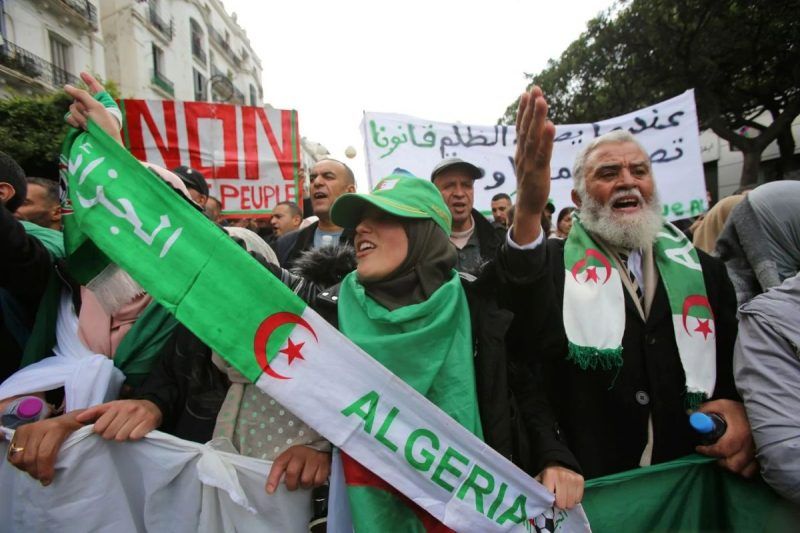
The powerful images of pro-democracy protests emerging from Beirut, Baghdad and Algiers remind us once again that Arab authoritarianism has outstayed its welcome. But, in the eyes of many, it hasn’t yet outlived its usefulness. The weakness of Arab states has reached a point where authoritarianism has become the only glue keeping them together. The challenge for Arab democrats is to move beyond simply calling for democracy and instead focus on building realistic pathways for democratic change.
Arab authoritarianism is not traditional despotism. It has morphed into a complex strategy to cope with state weakness. Arab states were not strong to begin with: They have never been able to provide policy frameworks that foster economic development and social justice; manage social and political conflicts; and protect their standing in the world.
Today, they sit on an unsustainable mix of growing poverty, endemic corruption, hollowed institutions, brutal security apparatuses, extreme social polarization and civil and regional conflicts. The bigger these challenges become, the weaker the states grow, aggravating these challenges further.
To repress social and political conflicts they could not resolve and to silence demands they could not meet, Arab regimes turned to coercion. Weak political institutions in countries such as Egypt fell in the grip of security agencies who took charge of governance, from sectarian to labor disputes. Gradually, regime survival became the overriding concern of these agencies, eroding respect for the rule of law and making human rights abuses common. This led to the further hollowing out of state institutions, now glued together by systematically administered fear.
Arab authoritarianism also relies on organized nepotism and corruption. Drawing on tribal, familial, sectarian or ethnic divisions, rulers have maintained patronage networks to exchange favors with powerful allies. The Arab state became the ultimate giver, with leaders of key social groups managing the flow of payoffs from above and loyalty from below. As Lebanon’s protests against these very patterns show, the ultimate result is the weakening of institutional standards, rules and processes.
Given the vital importance of managing favors and payoffs, crony capitalism took root, with Arab rulers occupying a controlling position of the economy and relegating market forces to various degrees of dependency. Instead of established norms and regulations that can survive the change of regimes, Arab markets function primarily through the patronage system. The Saudi crown prince’s detention of businesspeople in Riyadh’s Ritz-Carlton — accusing them of corruption and releasing them only after they paid large sums — is a glaring example of rulers’ ability to crush capital at will.
Finally, to compensate for their inability to resolve the century-old conflict between Islamists and secularists, Arab states have repressed and accommodated both, placing themselves as the arbiter between the groups and the gate protecting society — and the world — from the chaos that would ensue if this barrier were to collapse. Of course, authoritarian regimes did not create radical Islamism to scare us, but they made sure they became the only things standing between us and its violence. The use of the Islamic State by the Syrian regime offers a good illustration of this dynamic.
Arab democrats are focused on pushing back against repression, with little contemplation of what happens after. But events since 2011 have shown that authoritarian rulers can be toppled suddenly. How would a post-authoritarian government run hollowed institutions that function mainly through nepotism and fear, and security sectors infested with a culture of disregard for human rights? How would it govern an economy in the absence of regulatory frameworks that function outside the regime favors system? How would it manage extreme social polarization and, above all, the legitimate demands of tens of millions of poor?
It would either repress these demands and conflicts in the name of democracy — practically slipping into a new form of authoritarianism. Or it would allow them to come to the surface in the absence of effective frameworks to manage them, slipping into instability and possible collapse.
In Egypt, we learned this lesson firsthand. In 2011, when we chanted “the people want to topple the regime” in Tahrir Square, we thought we could quickly put together a framework to manage these concerns. We were joyful, compassionate and tolerant. But social and political conflicts proved more resilient than compassion, and we could not sustain our democratic experiment.
The idea that authoritarian rulers and their coercive apparatus are the main barriers to Arab democracy is a misleading simplification. The roads traveled by Iraqis, Libyans and Egyptians since the fall of their longtime dictators should lay this fantasy to rest. Authoritarianism plays social, economic and political roles. Replacing it with democratic governance requires much more than toppling regimes.
A million protesters demanding good governance will not achieve it. For lasting change, Arab democratic leaders must begin building robust partnerships among themselves and envisaging deals with those that benefited from authoritarianism. They must also prepare realistic pathways to revive dysfunctional state institutions. These are daunting tasks — but they mark the difference between making lofty demands and shaping reality.
Ezzedine C. Fishere is The Post's second Jamal Khashoggi fellow. He is the author of “The Egyptian Assassin” and a visiting professor at Dartmouth College.
